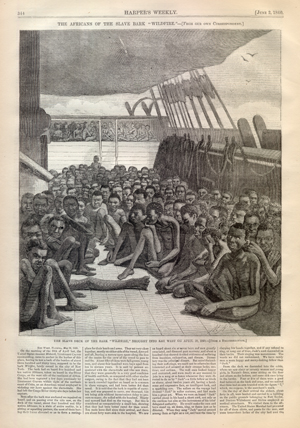Sunday, John Newton in Africa, 1748
The journey from Liverpool to Africa took eight weeks, followed by eight months of slave-trading operations up and down the coast. Although it was not Newton's first exposure to the unsavory deals and physical brutalities that were central to the bargaining between local tribal chiefs and white slavers when corralling a human cargo of natives for shipment to the West Indies, nevertheless this voyage was a new experience for him now that he was in a position of authority. As mate of the Brownlow, Newton was at the forefront of bartering worthless trinkets in return for able-bodied men, putting slaves in irons, dragging them on board the ship and keeping them captive in horrific conditions below the decks. There is no evidence that Newton's faltering journey of faith made any difference at this point to the treatment he inflicted on the slaves, during the Brownlow's journey along the west coast of Africa in 1748-1749. Tearing husbands away from wives and children, shackling these screaming men in heavy fetters, and chaining them in horrific, overcrowded squalor that would have disgraced the animal pens of an abattoir were routine tasks for the ship's mate of a slave-trading ship. It is likely that Newton carried them all out. Without being totally explicit on the licentious side of his excesses, it is clear from his later accounts of this period in his life that Newton indulged himself in the sexual abuse of native women on board ship, for he admitted that he had 'followed a course of evil, which a few months before I should not have supposed myself any longer capable....I had little desire and no power to recover myself.'---Jonathan Aitken,
John Newton, From Disgrace to Amazing GraceAmazing Grace, how sweet the sound,That saved a wretch like me.I once was lost but now am found,Was blind, but now I see.------John Newton,
Amazing Grace, first stanza, 1772


No comments:
Post a Comment